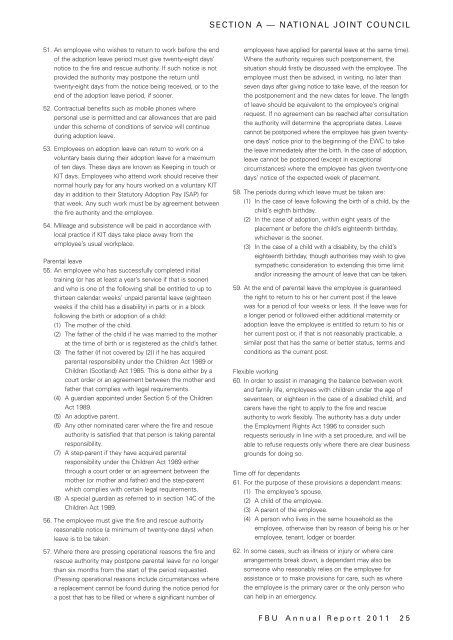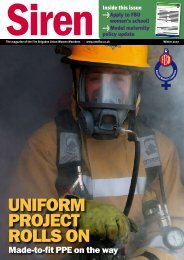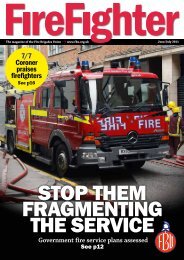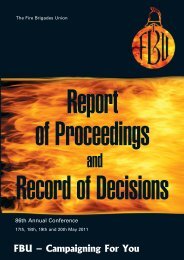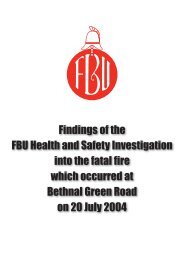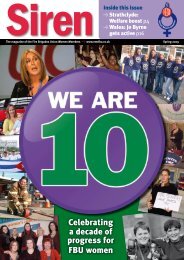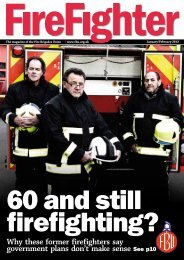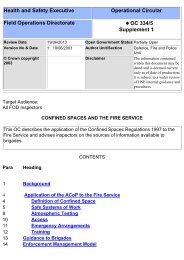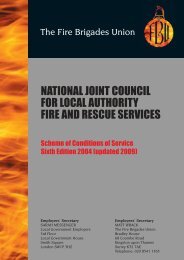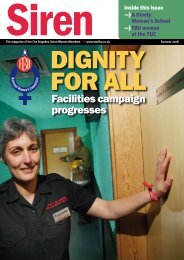Report - Fire Brigades Union
Report - Fire Brigades Union
Report - Fire Brigades Union
Create successful ePaper yourself
Turn your PDF publications into a flip-book with our unique Google optimized e-Paper software.
SECTION A — NATIONAL JOINT COUNCIL<br />
51. An employee who wishes to return to work before the end<br />
of the adoption leave period must give twenty-eight days’<br />
notice to the fire and rescue authority. If such notice is not<br />
provided the authority may postpone the return until<br />
twenty-eight days from the notice being received, or to the<br />
end of the adoption leave period, if sooner.<br />
52. Contractual benefits such as mobile phones where<br />
personal use is permitted and car allowances that are paid<br />
under this scheme of conditions of service will continue<br />
during adoption leave.<br />
53. Employees on adoption leave can return to work on a<br />
voluntary basis during their adoption leave for a maximum<br />
of ten days. These days are known as Keeping in touch or<br />
KIT days. Employees who attend work should receive their<br />
normal hourly pay for any hours worked on a voluntary KIT<br />
day in addition to their Statutory Adoption Pay (SAP) for<br />
that week. Any such work must be by agreement between<br />
the fire authority and the employee.<br />
54. Mileage and subsistence will be paid in accordance with<br />
local practice if KIT days take place away from the<br />
employee’s usual workplace.<br />
Parental leave<br />
55. An employee who has successfully completed initial<br />
training (or has at least a year’s service if that is sooner)<br />
and who is one of the following shall be entitled to up to<br />
thirteen calendar weeks’ unpaid parental leave (eighteen<br />
weeks if the child has a disability) in parts or in a block<br />
following the birth or adoption of a child:<br />
(1) The mother of the child.<br />
(2) The father of the child if he was married to the mother<br />
at the time of birth or is registered as the child’s father.<br />
(3) The father (if not covered by (2)) if he has acquired<br />
parental responsibility under the Children Act 1989 or<br />
Children (Scotland) Act 1985. This is done either by a<br />
court order or an agreement between the mother and<br />
father that complies with legal requirements.<br />
(4) A guardian appointed under Section 5 of the Children<br />
Act 1989.<br />
(5) An adoptive parent.<br />
(6) Any other nominated carer where the fire and rescue<br />
authority is satisfied that that person is taking parental<br />
responsibility.<br />
(7) A step-parent if they have acquired parental<br />
responsibility under the Children Act 1989 either<br />
through a court order or an agreement between the<br />
mother (or mother and father) and the step-parent<br />
which complies with certain legal requirements.<br />
(8) A special guardian as referred to in section 14C of the<br />
Children Act 1989.<br />
56. The employee must give the fire and rescue authority<br />
reasonable notice (a minimum of twenty-one days) when<br />
leave is to be taken.<br />
57. Where there are pressing operational reasons the fire and<br />
rescue authority may postpone parental leave for no longer<br />
than six months from the start of the period requested.<br />
(Pressing operational reasons include circumstances where<br />
a replacement cannot be found during the notice period for<br />
a post that has to be filled or where a significant number of<br />
employees have applied for parental leave at the same time).<br />
Where the authority requires such postponement, the<br />
situation should firstly be discussed with the employee. The<br />
employee must then be advised, in writing, no later than<br />
seven days after giving notice to take leave, of the reason for<br />
the postponement and the new dates for leave. The length<br />
of leave should be equivalent to the employee’s original<br />
request. If no agreement can be reached after consultation<br />
the authority will determine the appropriate dates. Leave<br />
cannot be postponed where the employee has given twentyone<br />
days’ notice prior to the beginning of the EWC to take<br />
the leave immediately after the birth. In the case of adoption,<br />
leave cannot be postponed (except in exceptional<br />
circumstances) where the employee has given twenty-one<br />
days’ notice of the expected week of placement.<br />
58. The periods during which leave must be taken are:<br />
(1) In the case of leave following the birth of a child, by the<br />
child’s eighth birthday.<br />
(2) In the case of adoption, within eight years of the<br />
placement or before the child’s eighteenth birthday,<br />
whichever is the sooner.<br />
(3) In the case of a child with a disability, by the child’s<br />
eighteenth birthday, though authorities may wish to give<br />
sympathetic consideration to extending this time limit<br />
and/or increasing the amount of leave that can be taken.<br />
59. At the end of parental leave the employee is guaranteed<br />
the right to return to his or her current post if the leave<br />
was for a period of four weeks or less. If the leave was for<br />
a longer period or followed either additional maternity or<br />
adoption leave the employee is entitled to return to his or<br />
her current post or, if that is not reasonably practicable, a<br />
similar post that has the same or better status, terms and<br />
conditions as the current post.<br />
Flexible working<br />
60. In order to assist in managing the balance between work<br />
and family life, employees with children under the age of<br />
seventeen, or eighteen in the case of a disabled child, and<br />
carers have the right to apply to the fire and rescue<br />
authority to work flexibly. The authority has a duty under<br />
the Employment Rights Act 1996 to consider such<br />
requests seriously in line with a set procedure, and will be<br />
able to refuse requests only where there are clear business<br />
grounds for doing so.<br />
Time off for dependants<br />
61. For the purpose of these provisions a dependant means:<br />
(1) The employee’s spouse.<br />
(2) A child of the employee.<br />
(3) A parent of the employee.<br />
(4) A person who lives in the same household as the<br />
employee, otherwise than by reason of being his or her<br />
employee, tenant, lodger or boarder.<br />
62. In some cases, such as illness or injury or where care<br />
arrangements break down, a dependant may also be<br />
someone who reasonably relies on the employee for<br />
assistance or to make provisions for care, such as where<br />
the employee is the primary carer or the only person who<br />
can help in an emergency.<br />
FBU Annual <strong>Report</strong> 2011 25


